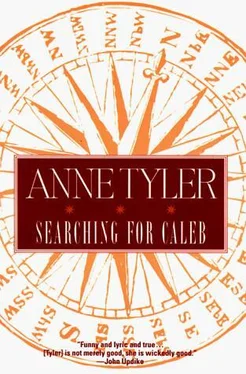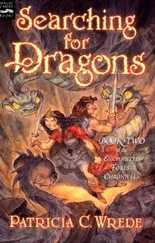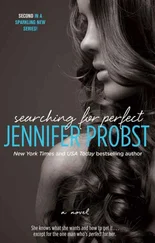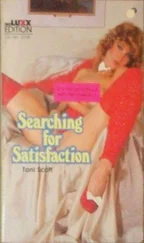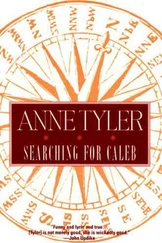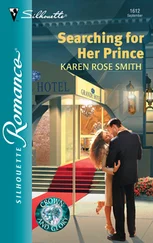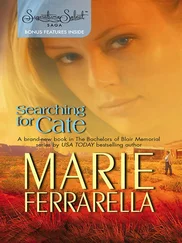Anne Tyler - Searching for Caleb
Здесь есть возможность читать онлайн «Anne Tyler - Searching for Caleb» весь текст электронной книги совершенно бесплатно (целиком полную версию без сокращений). В некоторых случаях можно слушать аудио, скачать через торрент в формате fb2 и присутствует краткое содержание. Жанр: Современная проза, на английском языке. Описание произведения, (предисловие) а так же отзывы посетителей доступны на портале библиотеки ЛибКат.
- Название:Searching for Caleb
- Автор:
- Жанр:
- Год:неизвестен
- ISBN:нет данных
- Рейтинг книги:5 / 5. Голосов: 1
-
Избранное:Добавить в избранное
- Отзывы:
-
Ваша оценка:
- 100
- 1
- 2
- 3
- 4
- 5
Searching for Caleb: краткое содержание, описание и аннотация
Предлагаем к чтению аннотацию, описание, краткое содержание или предисловие (зависит от того, что написал сам автор книги «Searching for Caleb»). Если вы не нашли необходимую информацию о книге — напишите в комментариях, мы постараемся отыскать её.
Searching for Caleb — читать онлайн бесплатно полную книгу (весь текст) целиком
Ниже представлен текст книги, разбитый по страницам. Система сохранения места последней прочитанной страницы, позволяет с удобством читать онлайн бесплатно книгу «Searching for Caleb», без необходимости каждый раз заново искать на чём Вы остановились. Поставьте закладку, и сможете в любой момент перейти на страницу, на которой закончили чтение.
Интервал:
Закладка:
"Ah, Madame Olita. She's gone."
"What, is she dead?"
"No, retired. She's not feeling so well, you know? But was she a fortune teller! I don't mind telling you, I used to go to her myself. Okay, so it's mumbo-jumbo. You know why I went? Say you got a problem, some decision to make. You ask your minister. You ask your psychiatrist, psychologist, marriage counselor, lawyer-they all say, 'Well of course I can't decide for you and we want to look at all the angles here and I wouldn't want to be responsible for-' They hedge their bets, you see. But not Madame Olita. Not any good fortune teller. 'Do X,' they say. 'Forget Y.' 'Stop seeing Z.' It's wonderful, they take full responsibility. What more could we ask?"
"Well, do you know where she is now? Could I just visit her?"
"Sure, she's right down the block. But I don't know how much she's up to.
Well, tell her I sent you, Joe sent you. Maybe she could use the company.
Five eight three, apartment A."
"Thank you very much," Justine told him.
"Hope you get the answer you want."
She let the door tinkle shut and walked on down the street, passing more cleaners and cut-rate pharmacies and pawnshops. At the end of the block was a large Victorian frame house surrounded by a veranda, and on the veranda sat Madame Olita in a Polynesian wicker chair. Although it was hot, she wore a crocheted shawl. She still had her stubby haircut, but she had lost an enormous amount of weight. Her clothes flopped and her neck was so scrawny that her face appeared to be lunging forward, vulture-like. She looked hollowed out. While Justine climbed the steps she watched without interest, perhaps assuming this was somebody else's visitor. "Hello, Madame Olita," Justine said.
"Hmmm?"
Madame Olita pulled herself together, wrapping the shawl more tightly around her shoulders.
"Joe sent me," Justine said.
"Oh? Joe."
"There's a question I wanted to ask. Would you mind?"
"Well, I'm feeling poorly these days, you see. I don't look into the future much."
"No, it wasn't about the future."
Madame Olita sighed. "Sit down," she said, pointing to the wicker chair beside her. She reached for Justine's hand, as if she hadn't understood.
"But I didn't want-"
Madame Olita bent Justine's palm back and frowned. "Oh, it's you," she said.
Justine felt pleased and shy, as if her unusual lines were her own accomplishment.
"Yes, I see," said Madame Olita, nodding and tapping her teeth with one finger.
"You said my marriage was going to disrupt everything," Justine reminded her.
"Did I."
"You said I would break my parents' hearts. How did you know that?"
"Oh, my dear," said Madame Olita, leaning back suddenly and dropping her hand. "Really, I don't remember. You were young and arrogant, and uncomfortable in my rooms, perhaps I just-"
"But it all came true!"
"Sometimes it does."
"Was that just luck?"
"It may have been. Sometimes it is, sometimes it isn't. Are you asking if I can truly see the future? I can. But more and more it seems to me that people are resisting change, digging in their heels against it. Which does make their futures easy to predict, but why bother? Fortune telling is only good when you forecast a happening. It falls flat when you say, 'Never fear, your life will continue in its present course forever . . ."
She closed her eyes and then opened them and looked puzzled. "But I tend to go on and on," she said. "You had some question you wanted to ask."
Justine sat up straight and placed her hands together. "Madame Olita," she said, "if my fortune was to break my parents' hearts, is it true then that I had no way of avoiding it?"
"Oh, no."
"No?"
Goodness, no. You can change your future. I have seen lines alter in a hand overnight. I have seen cards fall suddenly into places where they refused to appear at any earlier reading."
"I see," said Justine, and then she sank back. It was the first answer that sounded right to her, but now she couldn't think why she had wanted to hear it. She felt limp and drained.
"Otherwise," said Madame Olita, "why take any action at all? No, you can always choose to some extent. You can change your future a great deal.
Also your past."
"My past?"
"Not what's happened, no," Madame Olita said gently, "but what hold it has on you."
"Oh."
"If you are so interested, I will teach you the art yourself if you like."
"The-oh, well, I-"
"Cards would be your skill, I think."
"Thank you anyway," Justine said.
"Never mind. You'll be back. I sit here every day of the week, taking the air. You can always find me. Shut the front gate going out, if you will."
On Monday, Justine told Duncan that she was thinking of becoming a fortune teller. "Oh, really?" he said. "Aren't you going to laugh?"
"Not yet," he said. "First I have to see how good you are." So she drove off to Baltimore again, to the white frame house where Madame Olita nodded dimly in her Polynesian chair.
"These are ordinary playing cards," said Madame Olita, but to Justine they looked anything but. They were very old and the back of each was different: antique circus scenes of clowns, trapeze artists; dancing dogs, and bareback riders. "They once belonged to my mother. Who, though you wouldn't believe it to look at me, was a genuine gypsy lady with seven ruffled petticoats and tiny brass cymbals that attached to her fingers for keeping time while she danced. She was raised in an abandoned candy store on Gay Street. Not exactly a painted wagon, but still . . . unfortunately she married my father, a high school civics teacher. She left her old life entirely, she cut off her long black hair, she had two daughters whom she sent to Radcliffe. However, I would rather have been raised a gypsy."
She cut the cards. Justine sat across from her with her mouth open.
"It was my plan, after I graduated from Radcliffe, to join a caravan and marry a man with one gold earring. But it didn't work out that way. I looked then more or less as I do today. I never married anyone, let alone a gypsy. So I had to get a job in my father's high school, teaching algebra, but meanwhile I had learned fortune telling from my mother. Dancing I never mastered. I tried, though. My sister was quite good at it. But I bettered her at fortune telling. How I coveted these cards! My mother refused to give them to me. Cards like these are passed on only when the owner is dying, you see, and has no further use for them. Naturally I didn't want my mother to die. But shall I tell you?
When she failed to wake from surgery at the age of fifty-seven, the first thing I thought was, 'Now I can have the cards.' I went home and got them out of her wooden chest, then I walked over to the school and resigned my position. I set up shop in east Baltimore, above the cleaner's. I have never laid eyes upon a caravan."
She laid the cards out in concentric circles on a wicker table.
"My sister," she said, "got the cymbals."
Then she frowned and stabbed a card with her forefinger. "But pay attention! These cards are not read like books, you know. They have meanings assigned that you can memorize in half an hour, but ambiguous meanings. The death card, for instance. So called. But whose death? The client's, or someone's close to him? And when? Is it real or metaphorical? No, you must think of these cards as tags."
"Tags," Justine said blankly.
"Tags with strings attached, like those surprise boxes at parties. The strings lead into your mind. These cards will pull out what you already know, but have failed to admit or recognize. Which is why palmistry works as well, or tea leaves or the Tarot or crystal balls, although I myself have yet to see a thing in a crystal ball. They all have validity, yes, but only when coupled with your own intuitions. You could take up astrology, even, but I already know: you haven't the scholarly mind for it."
Читать дальшеИнтервал:
Закладка:
Похожие книги на «Searching for Caleb»
Представляем Вашему вниманию похожие книги на «Searching for Caleb» списком для выбора. Мы отобрали схожую по названию и смыслу литературу в надежде предоставить читателям больше вариантов отыскать новые, интересные, ещё непрочитанные произведения.
Обсуждение, отзывы о книге «Searching for Caleb» и просто собственные мнения читателей. Оставьте ваши комментарии, напишите, что Вы думаете о произведении, его смысле или главных героях. Укажите что конкретно понравилось, а что нет, и почему Вы так считаете.
